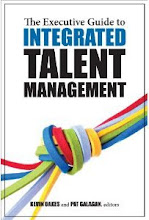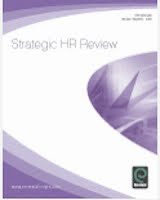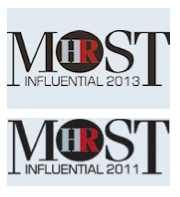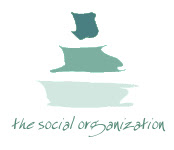Over the next couple of days, I'm going to be continuing the series of posts on the 'global reset' that I began earlier this month:
- Corporate social responsibility in the global recession
- HR's main responsibility
- Innovating in the downturn
- HR in the spotlight: banking bonuses
- Sexism in the City
- Ctrl-Alt-Del: your comments.
Firstly, I've been thinking about my response to Jo, who challenged me to think more clearly about the changes I believe may be coming. However, although I've thought about this in a couple of different ways, I keep on coming back to a diagram I used in my Digital HR webcast with Knowledge Infusion, and another webinar with Kennedy Information, last year. This is it (slightly updated):
The diagram suggests that two key factors associated with the business context (the competitive environment, and new technology), and another two factors linked to the employment relationship (the demands of the organisation, and changing expectations of the individual) are influencing workforce attitudes.
- In terms of the environment - globalisation; increasing focus and importance given to human capital; and also to internal diversity, supporting increasing external diversity (of customers, partners etc) are leading to increased sensitivity and intelligence in approaches to business.
- Organisation pressures focus on the increasing proportion of work which is knowledge-based, and also the proportion of knowledge that is included within 'non-knowledge based roles' (it's becoming increasingly difficult to identify roles in which knowledge isn't now a key component). This means that work is increasingly intangible and leads to increasingly disparate levels of performance between the strongest and weakest employees., therefore emphasising the role of talent management. And knowledge work can be done anywhere, so virtual teaming is increasingly important.
- Individual pressures focus on what I call 'millennial expectations' which are especially evident in the millennial generation, but I think are also increasingly prominent in the rest of us as well. These expectations are supported by a desire to be treated as individuals, with our own identities and needs for self-actualisation, but also a growing need to be part of a community.
- The key technological change is the growing access to, and comfort with, new media, including social networking, and web / knowledge 2.0 applications, enabling user driven content.
The factors impact on workforce attitudes through customer, investor and stakeholder attitudes (none of us are employees alone), and also by the recession. This is driving some factors forward (for example - talent management: we need to get much better at understanding what good performance really looks like, and rewarding it effectively), and constraining others (for example, millennial expectations - people are increasingly happy to have a job, and forgetting about their desire for meaningful work). However, the greatest impact of the recession is to increase the attention we're giving to this whole picture, which has the potential to increase the rate of change, regardless of the strength of the individual forces.
And here are some of the changes I think may result from these forces. This diagram is still very much work in progress, but is the best answer I think I can give to Jo.
- Culturally intelligent management is a response to the increasingly global, diverse environments in which many firms now operate. It implies an increasingly sensitive, empathetic and personalised approach to people management.
- Conversation based development recognises that the key improvement tool in a knowledge based environment is the conversation that people have which each other, and attempts to increase the quality of the conversation in order to improve business performance.
- Transparent communication is a result of the use of social media - if you're reading this, you recognise the effect.
- Team orientation is a response to the increasing expectations of the workforce - it doesn't ignore the individual, but focuses on individual within a social context (individual and team at the same time).
- All of this is based on relationships based on trust, or it doesn't work at all.
There you go, Jo. I hope it helps - any suggestions?
Of course, I still don't know whether the 'global reset' will actually encourage these changes to take place, and will come back to this question over the next few days...
- Consulting - Research - Speaking - Training - Writing
- Strategy - Talent - Engagement - Change and OD
- Contact me to create more value for your business
- jon [dot] ingham [at] strategic [dash] hcm [dot] com
.































Will the global reset encourage these changes? I think the changes have happened.
ReplyDeleteThe questions for me are who will trade through the global reset? Who will hang on either stubbornly or because of some kind of entrenched privilege? What will happen if too many businesses resist change? Which businesses will emerge in the new age?
For example, what will banking look like? Has the UK got some businesses based on 'new science' that will rise in prominence? Even in something like the hospitality sector, what will happen to restaurants and shops who are have no sense or capacity to understand changing business models? Which sectors have professional groups who are modeling changes and helping their members understand what is happening?